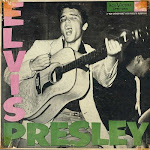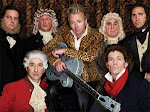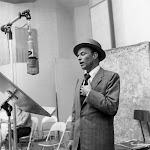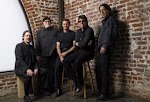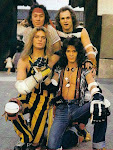

Numerous web sites, ZZ Top's Official Web Site (music plays immediately when the site opens), The Rock And Roll Hall Of Fame and Famous Texans were quite helpful in preparing my tribute to ZZ Top. Please click on the hyperlinks to enjoy these web sites.
The classic rock trio known for its Texas heritage, bearded, haggard look, reclusive mystique, hard-nosed business tactics, and blues-rock sound, ZZ Top (a.k.a., That Little ol' Band from Texas) was inducted into the Rock And Roll Hall Of Fame, as performers, in 2004. Keith Richards (the Rolling Stones) is their presenter. Keith Richards Official Web Site
Click here to see the Rock And Roll Hall Of Fame Inductee List.
The members of ZZ Top are Billy Gibbons (guitar, keyboards, vocals; born December 16, 1949), Dusty Hill (bass, keyboards, vocals; born May 19, 1949), and Frank Beard (drums; born June 11, 1949). Ironically, “Beard” is the one without a beard. Gibbons & Hill have mighty impressive beards.
ZZ Top plays red-hot Texas boogie and blues, and no one does it better - or has done it longer - than this “little ol’ band from Texas.” The trio’s enduring appeal owes much to their mastery of and feel for rootsy forms, and fantastic videos containing beautiful women. ZZ Top Video - Legs
Guitarist Billy Gibbons, bassist Dusty Hill and drummer Frank Beard were influenced by such blues masters as Freddie King, Lightnin’ Hopkins, Muddy Waters and John Lee Hooker. While growing up in suburban Houston, Gibbons learned about R&B music from his family's maid, who was African-American.
From the beginning they took a hard-rocking power-trio approach to the blues, cultivating a new audience for it in the Seventies and Eighties with superior musicianship as well as attitude, style and some devilishly funny songs.
The genius of ZZ Top is that they’re reverential about the blues but loose and funny about the subject matter of their songs. Their songs are laden with pop-culture references, sexual double entendres and the determined pursuit of a good time. They have written about fast cars, fishnet stockings, sharp clothes, TV dinners, cheap sunglasses and “tush.” They visually connected with the MTV generation by virtue of Hill’s and Gibbons’ long beards and fur-lined guitars. For many, ZZ Top have been the premiere party band on the planet. Certainly, they have been Texas’s foremost cultural ambassadors.
Guitarist Billy Gibbons met his future manager, Waxahachie native Bill Mack Ham, backstage at The Doors concert in Houston in 1967. Gibbons' band at the time, The Moving Sidewalks, had a local hit with the song "99th Floor." They soon opened on The Doors' Texas tour. After later opening for the Jimi Hendrix Experience, Hendrix named Gibbons his favorite guitar player during an appearance on The Tonight Show With Johnny Carson. The Sidewalks broke up and Gibbons and Ham contracted to form a new band.
After a few false starts with other musicians, the Gibbons-Hill-Beard version of ZZ Top was founded in 1969. According to Gibbons, the name came from one or more of the following: the two brands of rolling-paper, Zig-Zag and Top, a tribute to blues legend Z.Z. Hill, and/or Gibbons seeing the two words running together on a dilapidated bill board. Hill and Beard had been members of a Dallas band called American Blues.
ZZ Top formed in 1969 as Gibbons’ psychedelic blues band, The Moving Sidewalks, (who released one album, Flash), was coming apart. He hooked up with Beard and Hill, who’d played in American Blues (which cut a pair of albums). The trio bonded around a shared love of basic blues, boogie, rock and all things Texas-related. ZZ Top played its first show in February 1970.
The trio spent its first few years playing mostly regional concerts. Ham's bosses, Houston record producer Pappy Daily and family, cut a deal with him to finance "ZZ Top's First Album" (1971). Five other records followed on the London Records label - home of the Rolling Stones and John Mayall, a plus in the group’s eyes. Their earliest albums - ZZ Top's First Album (1971) and Rio Grande Mud (1972) - staked out their bluesy, no-frills territory and gave them a chart hit, “Francene.”
ZZ Top solidified their sound on “Tres Hombres” (1973) by recording in Memphis. This album brought them national attention. Its hit song "La Grange," about a whorehouse, was a growling boogie about the same place celebrated in The Best Little Whorehouse in Texas. It was allegedly based on John Lee Hooker's "Boogie Chillen." It is still the band's signature riff tune. Also included was "Beer Drinkers & Hell Raisers," the would-be anthem. Musically, the union of Texas blues and Memphis soul became a hallmark of ZZ Top.
The band built a word-of-mouth fan base on the road, and nonstop touring in turn propelled record sales. Tres Hombres reached #8 and became the first in an unbroken string of eleven gold and platinum albums. The next two albums - Fandango (1975) and Tejas (1977) - hit #10 and #17, respectively. Fandango yielded the hard-driving “Tush,” which became ZZ Top’s first Top Forty single.
Their lean, driving approach helped launch the Seventies on its hard-rocking course. They brought rootsy vigor to the music scene, surviving over the decades by demonstrating an ability to adapt and evolve without radically altering the foundations of their sound.
In an event that tried to be a rock-style Willie Nelson Picnic, the group was the featured headliner in the "Rompin' and Stompin' Barndance and Barbecue," held in Austin on Labor Day, September 1, 1974. Appearing with them before a crowd of 80,000 was San Francisco legend Bill Graham, Carlos Santana, Joe Cocker and Bad Company making its U.S. debut. This was ZZ Top's first concert in which they were seen as more than just a Texas act. It was the biggest concert in Austin's history, and the last to be held in Memorial Stadium on the University of Texas Campus for another twenty years. The stadium had been trashed by concert-goers, who had suffered from the heat and lack of food, water and toilets.
ZZ Top carried stagecraft to elaborate heights with its Worldwide Texas Tour: Taking Texas to the People. The year-and-a-half-long Worldwide Texas Tour, which came between Fandango and Tejas, had stage props like haystacks, ranch tools and Longhorn cattle, began in 1975. ZZ Top lugged 75 tons of equipment and animals native to Texas, including a buffalo, a longhorn steer, buzzards and rattlesnakes. They also performed on a Texas-shaped stage. Afterward, an exhausted ZZ Top took an extended hiatus. It featured songs from "Tres Hombres" and "Fandango". Although their concert earnings were now in the tens of millions, by the end of the tour the group was exhausted. They took a break that ended up lasting three years.
Manager Bill Ham stayed busy, however, shrewdly negotiating a lucrative recording contract with Warner Brothers that is still talked about in the music business. A fiery new album, “Degüello” (1979) was filled with instant classics: “Cheap Sunglasses,” “Fool for Your Stockings,” “I’m Bad, I’m Nationwide,” and their remake of Sam and Dave’s “I Thank You.” Their next album, “El Loco” (1981) yielded another naughty anthem (“Tube Snake Boogie”) and poised them for a phenomenal explosion in popularity.
In 1981, ZZ Top joined a diverse group, organized by art patron and civic leader Marilyn Lubetkin and including such philanthropists as Dominique de Menil, to donate money to purchase J.D. McKissack's Orange Show from his heir. The Orange Show, an open-air, multimedia sculptural installation dedicated to the orange, is Texas' leading example of an art form called "folk art environment." For their support of the blues and an art form, the band was given a piece of wood from Muddy Waters' shack in Clarksdale, Mississippi. They had it made into a guitar, named it the "Muddywood," and sent it on a tour to raise funds for the Delta Blues Museum in Clarksdale, Mississippi.
In the Eighties, ZZ Top discovered synthesizers, and drum machines, and MTV discovered ZZ Top. The group’s bluesy, irreverent approach to synths appealed to fans of rock, blues, boogie, disco, and New Wave alike. “Eliminator”, whose title and cover were inspired by Gibbons’ hot-rodded ’34 Ford coupe, became one of the biggest albums of the decade, selling more than 10 million copies. Three of its songs - “Gimme All Your Lovin’” (#37), “Sharp Dressed Man” and “Legs” (#8) - were radio, video and club hits. "Eliminator" debuted ZZ Tops biggest hits, "Legs" and "Sharp-Dressed Man."
Until MTV came along in the '80s, ZZ Top had declined all offers for TV appearances. Their first video, "Gimme All Your Lovin'," set the style for follow-ups "Legs" and "Sharp-Dressed Man." The addition of videos took the band's famous mystique and popularity to an all-time high. With its leggy, model-strewn video, ZZ Top Video - Legs “Legs” remains the biggest single of ZZ Top’s career. The group's next album, "Afterburner," with its continued use of synthesizers, became a worldwide smash hit.
From the release of Eliminator (1983) until The Best Of ZZ Top dropped off the charts ten years later, ZZ Top were international superstars. The group followed Eliminator with Afterburner (1985), which yielded four Top Forty hits: “Sleeping Bag” (#8), “Stages” (#23), “Rough Boy” (#22) and “Velcro Fly” (#35). The trade magazine Pollstar declared ZZ Top the top touring act of 1986. “Recycler” (1990) completed the trilogy that had commenced with Eliminator and several instant classics - “Give It Up,” “Doubleback,” “My Head’s in Mississippi” - to the repertoire. Of the title Recycler, Gibbons remarked, “We’ve been reinventing ourselves for quite awhile; in our own way, we’ve made every effort to preserve our precious rock and roll environment.” The Afterburner tour marked another tour pinnacle, offering cosmic blues and boogie from a Disney-designed stage strewn with futuristic props.
By 1990, the band had sold 50 million records. In July 1992, ZZ Top announced that they were moving from Warner Bros. to RCA. They’ve since recorded four more albums - Antenna (1994), Rhythmeen (1996), XXX (1999) and Mescalero (2003). ZZ Top's 1996 album, "Rhythmeen" was considered one of their best. Gibbons called it the "first pure trio record of our career," because only the three of them played on it. That return to an earlier sound, made more pure and raw, continued on their 1999 album, "XXX," which celebrates the band's thirtieth anniversary. At the turn of the century, ZZ Top was the only rock group with its original members after three decades.
To this day they remain one of rock’s most entertaining live acts. After three and a half decades, the “little ol’ band from Texas” just keeps rolling.
Time Line:
May 19, 1949: Dusty Hill of ZZ Top is born in Dallas, Texas.
June 11, 1949: Frank Beard of ZZ Top is born in Frankston, Texas.
December 16, 1949: Billy Gibbons of ZZ Top is born in Houston, Texas.
December 25, 1963: A teenaged Billy Gibbons gets his first guitar for Christmas: a Gibson Melody Maker.
June 1968: The Moving Sidewalks, Billy Gibbons’ pre-ZZ Top band, opens for Jimi Hendrix, who will later remark on The Dick Cavett Show that Gibbons is one of his favorite guitarists.
1969: ZZ Top release their first single, “Miller’s Farm,” on manager Bill Ham’s Scat label. It is reissued on London Records when they sign to the label but fails to chart.
"He's our kind of guy." -- Frank Beard to Billy Gibbons after Beard introduced himself to Dusty Hill in a bar. Hill passed out drunk before returning Beard's greeting.--1969
February 10, 1970: ZZ Top perform their first live show at a Knights of Columbus Hall in Beaumont, Texas.
August 4, 1973: ZZ Top’s third album, Tres Hombres, enters the charts. Keyed by the FM favorite - and near AM hit - “La Grange,” Tres Hombres rises to #8 and becomes the band’s first gold album.
September 1974: ZZ Top draws 80,000 fans to a Labor Day stadium concert that they dub “ZZ Top’s First Annual Texas Size Rompin’ Stompin’ Barndance and Bar B.Q.” Also on the bill: Santana, Joe Cocker, Bad Company.
May 17, 1975: ZZ Top’s half-live, half-studio album Fandango! enters the charts and yields the Texas trio’s first big hit, “Tush.”
November 24, 1979: ZZ Top breaks a nearly three-year hiatus by releasing Deguello, their first album for Warner Bros.
April 23, 1983: ZZ Top issues Eliminator, which peaks at #9, stays on the charts for over three years and eventually is certified ten times platinum.
May 18, 1984: ZZ Top’s biggest hit, “Legs” (from Eliminator) enters the pop charts, where it will peak at #8. “Sleeping Bag” (from Afterburner) will repeat the feat a year later.
September 18, 1984: At the first annual MTV Video Awards, ZZ Top wins in two categories: Best Group Video (for “Legs”) and Best Direction (“Sharp Dressed Man”).
November 16, 1985: Afterburner, ZZ Top’s hotly anticipated followup to Eliminator, enters the album charts, where it will peak at #4.
October 1, 1990: ZZ Top kicks off a yearlong world tour in support of Recycler, their first album in five years.
May 4, 1991: ZZ Top Day is declared by Texas governor Ann Richards.
1993: ZZ Top releases Antenna, their first album for RCA and seventh to go platinum.
1999: ZZ Top releases XXX, a new album that coincides with the group’s 30th anniversary.
October 14, 2003: Chrome, Smoke & BBQ: The ZZ Top Box, a four-disc career retrospective, is released.
March 15, 2004: ZZ Top is inducted into the Rock and Roll Hall of Fame at the nineteenth annual induction dinner. Keith Richards (the Rolling Stones) is their presenter. Keith Richards Official Web Site
Recommended Readings:
Sharp Dressed Man: ZZ Top Behind the Scenes from Blues to Boogie to Beards David Blayney. New York: Hyperion, 1994.
ZZ Top Robert Draper. New York: Ballentine Books, 1994.
“ZZ Top: Twenty Years of Texas Cool” Cub Koda. Goldmine (October 18, 1991): 8-16+.
Chrome, Smoke & BBQ: The ZZ Top Box Set Warner Bros., 2003. (Note: The booklet accompanying this box set contains biographical and discographical information.)
Fandango (1975)
The Best Of ZZ Top (1977)
Degüello (1979)
Eliminator (1983)
I love ZZ Top, members of The Rock And Roll Hall Of Fame, for their great videos, including ZZ Top Video - Legs. They have many great songs, including Beer Drinkers & Hell Raisers, Black Betty, Cheap Sunglasses, Fool For Your Stockings, Gimme All Your Lovin’, Got Me Under Pressure, I’m Bad, I’m Nationwide, La Grange, Legs, Rough Boy, Sharp Dressed Man, Sleeping Boy, Tush, TV Dinners, and others.
Thanks, ZZ Top, for over 30 years of great music, and great videos.















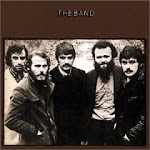



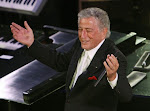














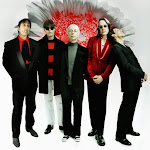
























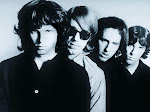
























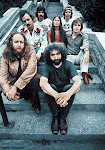




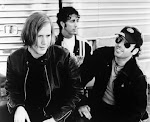

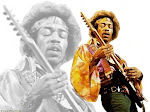









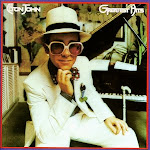




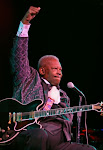


















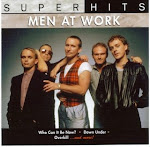%2B-%2BRock.jpg)

















